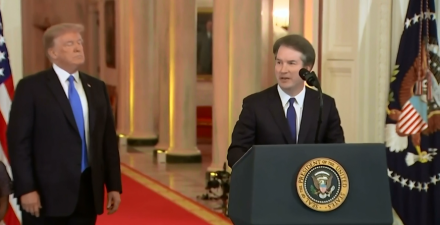In Priests for Life, Judge Kavanaugh Makes Clear that He Prioritizes Religious Beliefs Over Women’s Health


Judge Kavanaugh’s position in the 2015 Priests for Life v. Dep’t of Health and Human Services case reveals his willingness to let employers’ religious beliefs override people’s access to healthcare. In Priests for Life, Judge Kavanaugh broke ranks with other judges on the U.S. Court of Appeals for the DC Circuit and authored a dissenting opinion that would have allowed employers and universities to deny birth control coverage to their employees and students. Priests for Life sounds an alarm bell for how Judge Kavanaugh would rule in cases likely to come before him on the Supreme Court, including challenges to the Trump Administration’s efforts to allow religious beliefs to dictate patient care.
Background
Priests for Life involved a challenge to the Affordable Care Act’s contraceptive coverage requirement, which requires health plans to cover the full range of FDA-approved birth control methods, alongside other women’s preventive services, without out-of-pocket costs to the individual. The ACA contraceptive coverage requirement is incredibly important to women across the country. Thanks to the ACA, 62.4 million women are eligible for coverage of the birth control method that works best for them, irrespective of cost.
To accommodate the religious beliefs of certain employers and universities who object to birth control coverage, the government created a process that allows them to essentially be exempted from the contraceptive coverage requirement while at the same time ensuring that women get the birth control coverage guaranteed to them by the ACA. Under this so-called “accommodation,” objecting organizations must simply notify the government or their insurance company that they want out, and that’s it, they don’t have to provide coverage for birth control. Instead, employees and students get the coverage directly from their insurance company.
Even though they were already allowed out of the ACA contraceptive coverage requirement, several objecting employers and universities filed lawsuits, claiming that their religious beliefs were violated by having to give the notice. They sued under a federal statute called the Religious Freedom Restoration Act (RFRA), which says that the government can’t “substantially burden” religious exercise unless the government has a very important reason for doing so—a so-called “compelling interest”—and so long as there is no less burdensome way for the government to advance that interest. Eight federal circuit courts of appeals to consider the issue (including Kavanaugh’s own DC Circuit) flatly rejected the objecting organizations’ RFRA challenges, concluding that filling out the opt-out form does not “substantially burden” religious freedom because it is federal law—and not any action by these organizations—that ensures women receive the coverage.
But Judge Kavanaugh disagreed, going out of his way to write his own dissenting opinion that spells out an extraordinarily broad view of how religion can be used to avoid complying with the law.
Substantial Burden
The objecting organizations claim that giving the notice makes them “complicit” in providing the contraceptives since the insurance companies must provide it directly to the employees. But it is federal law that requires the insurance plan to provide the coverage. As the majority explains, “a woman who obtains health insurance coverage through her employer is no more entitled to contraceptive coverage if her employer submits the disputed notice than if it does not. The ACA obligation to provide contraceptive coverage to all insured women does not depend on that notice.” In other words, the inquiry is not about religious beliefs, it is about how the law operates.
Kavanaugh disagrees. Judge Kavanaugh says that the courts had no right to question the religiously-affiliated organizations’ claim that by filling out the form they would be helping women access birth control, even though that belief was based on an incorrect understanding of how the accommodation actually works. To Judge Kavanaugh, even if the religiously-affiliated organizations were “misguided” in thinking that the accommodation made them “complicit” in “wrongdoing,” the courts had no power to second-guess them. In other words, Judge Kavanaugh would require courts to rubber stamp any organization’s claim that they don’t have to follow a law because it “substantially burdens” religion, even if that claim is based on an objectively wrong understanding of the law.
Even though the whole point of the accommodation is to avoid burdening religious beliefs, Judge Kavanaugh writes that it violates religious beliefs. He even goes so far as to compare requiring objecting organizations to submit the form to forcing a Sabbath observer to work on the Sabbath.
As the judges in the majority put it, this approach creates a “potentially sweeping, new RFRA prerogative for religious adherents to make substantial-burden claims based on sincere but erroneous assertions about how federal law works.” This reading of RFRA would give organizations tremendous power to bring claims in order to refuse to comply with laws —including anti-discrimination and consumer protection laws—that they claim violate their religion.
Compelling Government Interest
Having determined that the accommodation substantially burdens the plaintiff organizations’ exercise of religion, Judge Kavanaugh turns to the next stage of the RFRA analysis: whether the government could nonetheless enforce the accommodation against them because it serves the important, or “compelling” government goal of promoting their employees’ and students’ access to birth control.
Judge Kavanaugh never explicitly holds that making sure women get birth control coverage is a “compelling” governmental objective. Instead, he admits that the Hobby Lobby decision via five justices—Justice Kennedy and the four dissenters—”strongly suggests” that guaranteeing birth control coverage is a compelling government interest. As Judge Kavanaugh puts it, the plaintiff organizations’ claim that this is not a compelling interest “cannot be squared with the views expressed by a majority of the Justices in Hobby Lobby.” But this admission is hardly reassuring. As a judge on the DC Circuit, Judge Kavanaugh was bound to follow Supreme Court precedent. If he were to become a Supreme Court justice, he would be able to reverse or change that precedent.
Least Restrictive Means
Ultimately, Judge Kavanaugh sides with the religiously-affiliated organizations, concluding that the accommodation was not the “least restrictive means” of ensuring that employees, students, and dependents receive the birth control coverage guaranteed to them by the ACA.
The opt out form requires objecting organizations to identify their insurance companies. As the judges in the majority explain, this is for an obvious and important reason—to make sure that insurers are promptly notified of the objection, as “[a]n insurer that is kept in the dark about an employer’s religious objections cannot do what it must to honor the opt out.”
Judge Kavanaugh takes issue with this requirement, and instead proposes a new alternative, one that wouldn’t actually work. He notes that in the cases Wheaton College and Little Sisters of the Poor, the Supreme Court had suggested that objecting organizations could file a simpler notice that does not identify insurers. Judge Kavanaugh concludes that this approach should also be used here, because in his view it would be less burdensome while “still further[ing] the Government’s compelling interest.”
Judge Kavanaugh’s approach does not, however, “still further” the government’s compelling interest in ensuring women receive birth control coverage. Although Judge Kavanaugh admits that his approach “may create some administrative inconvenience for the Government,” he downplays this concern, noting that this did not harm employees and students in Wheaton or Little Sisters. But in those cases the government already knew who the objectors’ insurance companies were because they identified those insurers during the litigation. That will not normally be the case. Under Judge Kavanaugh’s approach, the government would be forced to track down the insurers for every objecting entity nationwide, which will certainly cause administrative obstacles that could delay or even prevent the government from making sure that women seamlessly receive birth control coverage. A proposed alternative is not a “less restrictive means” of accomplishing a compelling government objective if it undermines rather than advances that objective.
Moreover, Judge Kavanaugh admits that some religiously-affiliated organizations claim that even this simpler notice would substantially burden their religious beliefs. Thus, his decision relies on a proposed alternative that he is well aware is also subject to challenge—which makes hollow his promises that women will still receive coverage under this approach.
**
So the bottom line: Judge Kavanaugh’s dissent shows results-oriented reasoning that creates startlingly broad protections for those who would use religion to deny birth control coverage, at the expense of people’s health and well-being.
Looking Forward: What Kavanaugh’s Decision in Priests for Life Means for the Future of Access to Birth Control
Several cases determining the future of birth control coverage are currently winding their way through the courts, including challenges to Trump-Pence administration rules that would gut the ACA contraceptive coverage requirement. The Trump-Pence rules allow virtually any employer or university to be exempted altogether from the requirement, without having to provide any notice to the government and without any mechanism like the accommodation for ensuring that women get birth control coverage.
Even though the ACA does not authorize these sweeping exemptions from the contraceptive coverage requirement, the Trump-Pence administration claims that it has statutory authority to issue these rules under RFRA—because the accommodation substantially burdens religion. Kavanaugh agrees with the Trump-Pence Administration on that critical point.
Cases challenging the Trump-Pence rules are currently on appeal before the First, Third, and Ninth Circuits, and could come before the Supreme Court as early as next year.
Birth control is basic health care and critical to women’s economic security, self-determination, and dignity. Access to affordable birth control is, without question, a compelling interest of the highest order. But Judge Kavanaugh’s nomination puts access to birth control in serious jeopardy. Priests for Life shows that Judge Kavanaugh can be expected to prioritize religious beliefs over access to reproductive health care if he is confirmed to the Supreme Court, potentially setting advances in women’s health and equality back decades.





